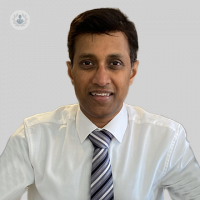Erectile dysfunction: Is the best cure medication or lifestyle changes?
Escrito por:Erectile dysfunction (ED) can impact many areas of life and can be caused by various factors. From neurological disorders to recreational drug use, there are many reasons why this condition (which often leaves men feeling deflated) can occur.

We decided to speak with Dr Indrajith Karunaratne, an expert in ED, who shared with us some ways in which we can prevent and treat this common condition that affects males—and often their partners. Read on to find out how to restore the ability to have an erection.
What are the common causes of erectile dysfunction?
The commonest cause of erectile dysfunction (ED) is vascular insufficiency. This means a blockage or impairment of blood supply to the penis. Blood vessels get blocked due to a process called atherosclerosis which means depositions of fat on the inside of blood vessels.
Atherosclerosis also leads to heart attacks and strokes. Neurological conditions such as Parkinson's disease, multiple sclerosis, epilepsy, spinal cord injuries and strokes are frequently associated with ED. ED is common in people with diabetes, as it causes both atherosclerosis as well as nerve damage.
Hormonal disorders such as testosterone deficiency, Thyroid disease and prolactinomas can cause ED. Surgical treatment for prostate cancer and urinary tract infections are also associated with ED.
The use of medications to treat high blood pressure, pain, heart and kidney diseases, gastritis, depression, and psychosis are associated with ED. Lifestyle factors such as smoking, alcohol and recreational drug use are sometimes associated with ED as well, so are psychological conditions such as anxiety and depression. Relationship difficulties could also cause ED.
What lifestyle changes can help to cure erectile dysfunction?
Refraining from smoking, excessive alcohol consumption and recreational drugs is known to improve ED. Obesity can reduce testosterone levels which in turn can cause ED. Therefore, keeping the body weight within normal range by eating healthily and doing regular exercises will help to improve erections.
How often is medication necessary for curing erectile dysfunction?
Medications for erectile dysfunction can be taken as "on demand" or "continuous" basis. Taking "on demand" means you only take it if you need an erection. Taking continuously means you take it every day whether you need an erection or not.
How often and for how long can people take medication for erectile dysfunction?
When medication is taken continuously it is taken as a single tablet, once daily. When taken as on demand basis, medication should not be taken repeatedly within 24 hours. There is no limitation as to how long you can keep taking ED medications.
What factors do you consider when creating a treatment plan for erectile dysfunction?
ED medications can interact with other medications. Sometimes these interactions could be very serious. Therefore, these interactions need to be checked before prescribing ED medications. ED medications can sometimes make other medical problems worse. For example, heart diseases. Therefore, a careful medical evaluation must be done before prescribing ED medications to people who have other medical conditions.
What happens if erectile dysfunction continues after trying medication and lifestyle changes?
Sometimes ED does not respond to lifestyle changes and medications. Surgical interventions are available to treat people in this situation. These interventions include repairing of blood vessels and fitting a penile prosthesis, which is an inflatable device that is implanted inside the penis which works with the help of a small battery-powered pump fitted inside the scrotum.
If you would like more advice regarding ED or any other aspect of genitourinary medicine, we recommend getting in contact with an expert such as Dr Indrajith Karunaratne . Book an appointment or e-Consultation via his TD profile today if you think you may require treatment.



